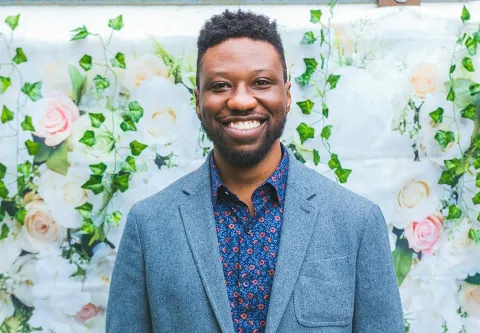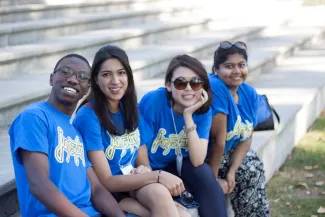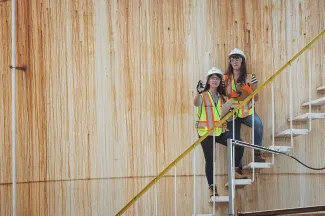"Engineering takes a collaborative approach to solving problems."

Joses Akampurira
- Degree:
- Bachelor of Applied Science
- Grad year: 2018
- Program:
- Campus: Okanagan
Job title as of 2023: Project Engineer, City of Vancouver
Why did you want to study engineering?
My desire to study engineering was inspired by wanting to make a positive difference in the community.
I grew up in a small town in Uganda called Kabale with several infrastructure challenges including unsafe roads, makeshift bridges, lack of clean water, frequent mudslides and unstable housing structures. My father tasked me with thinking about what my contribution to the community could be. He had been interested in engineering himself, but couldn’t afford the tuition costs. By working with him on projects around our home, I quickly became interested in engineering and construction. I also shadowed the municipal engineer and was inspired by how he was loved by the community. People would come up to thank him for fixing things and helping out. I realized I really wanted to be like this person.
What were some highlights of your undergraduate experience in Civil Engineering?
Being part of the co-op program allowed me to apply the things I learned in the classroom to the real-world. My first co-op job was with transportation engineering at the City of Surrey, which is where I developed an interest in this field. I loved how much it was in line with my personality. I got to talk to people directly and work closely with them to devise solutions that could benefit everybody.
On top of that, I was involved in several clubs, including the International Student Club and the African Caribbean Student Club. I also started UBC Okanagan’s Global Engineering Community, a group that brought together professors and students over tea. It was a way to break down barriers and to make it easier for students to interact with professors during the year.
Co-op ProgramAfrican Caribbean Student ClubUBCO Global Engineering Community

What kind of impact do you see engineers having in the world?
I like to think about engineers as mathematicians and scientists who are using their knowledge to solve practical problems.
Engineers are contributing a public service by developing solutions for problems that affect everybody. If you're moving from your home to the grocery store, you’re using a transportation system designed by an engineer. If you're taking a shower or filling your glass with clean water, an engineer was involved. When you flush your toilet, an engineer helped design the sewage treatment facility. The house or apartment you live in was likely the result of an engineer and architect working together.
On a personal level, I’ve seen the impact of my work at the City of Surrey, where I had the opportunity to work on some multi-million dollar projects. A lot of the projects I’ve worked on, I can now experience as an end user, whether I’m riding my bike or taking the bus.





